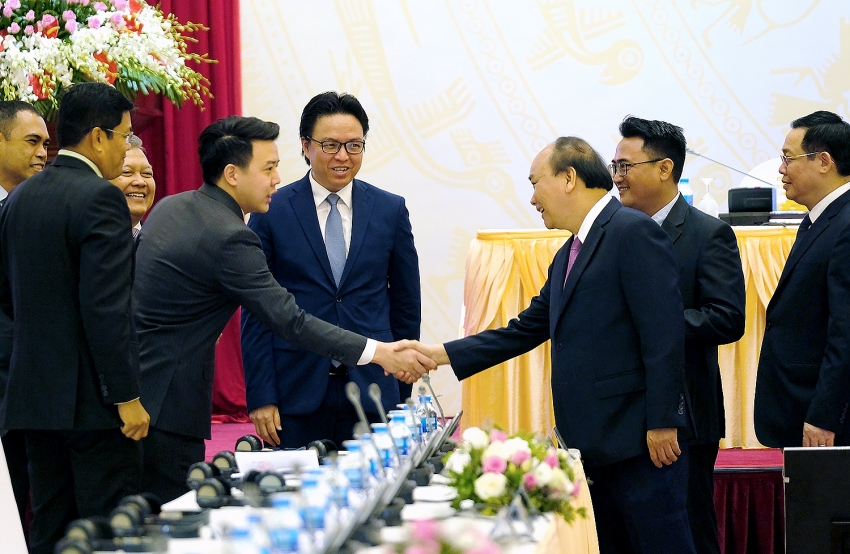Fifty per cent of specialised examination procedures, goods and products to be cut
 |
| Prime Minister Nguyen Xuan Phuc at the conference in Hanoi |
On July 24 a conference on strengthening the national single window mechanism (NSW), ASEAN single window (ASW) and trade facilitation took place in Hanoi. It was one of a series of conferences on logistics, promoting export, and Industry 4.0 aiming to further strengthen administrative procedures, look for solutions for improving the investment and business climate, facilitate business operations and improve national competitiveness.
In 2017, the average customs clearance fees reduced to $19 for a batch, saving $205 million for 10.81 million declarations and decreasing 15 million hours of export storage and 33 million hours of import storage.
According to VCCI’s survey, 95 per cent of businesses assessed that online declaration has shortened the time taken for customs clearance and helped facilitate their business operations. Further, 88 per cent of those surveyed are known to have implemented a single window mechanism and certificate of original (C/O) declaration.
However, according to Deputy Prime Minister Vuong Dinh Hue there are many shortcomings in the implementation of NSW, ASW, and specialised examinations. The number of goods which require an inspection to be conducted still makes up a large proportion, while the effectiveness of specialised examination is limited and the rate of detection is low (at just 1 per cent in 2017).
The number of normative legal documents that need to be revised or supplemented is high, and ministries and agencies have overlapped and duplicated in specialised examination.
To resolve these problems, Prime Minister Nguyen Xuan Phuc emphasised the need to combat trade, fraud and smuggling in both exports and imports to protect people’s health. Thereby, in addition to facilitating trade, regulations on the handling violations of food safety and trade fraud should be issued.
The PM asked to accelerate the circulation of goods and reduce the rate of specialised examinations to under 15 per cent, while still complying with the requirements of state agencies on fighting smuggling and trade fraud.
He also ordered the review, reduction and simplification of 50 per cent of the list of goods, products and procedures that require a specialised examination. Ministries and agencies must review normative legal documents on specialised management and reduce the number of items that need to be checked before customs clearance as much as possible.
“I urge all ministries, branches, and agencies to work together to further improve the investment business environment and enhance national competitiveness, aiming to strengthen sustainable development and growth,” said PM Phuc.
According to data from the customs agency, there were 82,760 items in the list of specialised management and examinations in the second quarter of 2015. This number reduced by 4,403 to 78,390 items in the first quarter of 2018.
| Some ministries have already changed their measures of management and examination, moving the time of examination from pre-clearance to post-clearance. Last year, the Ministry of Industry and Trade (MoIT) cut most of the conditions and procedures related to specialised examination, and moved the time of examining formaldehyde in textile products to post-clearance. The Ministry of Science and Technology has cut 91 per cent of the items that have to be checked before clearance. In addition, the Ministry of Health proposed to cut 95 per cent of the number of items that require specialised examination before import. |
What the stars mean:
★ Poor ★ ★ Promising ★★★ Good ★★★★ Very good ★★★★★ Exceptional
Related Contents
Latest News
More News
- Vietnamese businesses diversify amid global trade shifts (February 03, 2026 | 17:18)
- Consumer finance sector posts sharp profit growth (February 03, 2026 | 13:05)
- Vietnam and US to launch sixth trade negotiation round (January 30, 2026 | 15:19)
- NAB Innovation Centre underscores Vietnam’s appeal for tech investment (January 30, 2026 | 11:16)
- Vietnam moves towards market-based fuel management with E10 rollout (January 30, 2026 | 11:10)
- Vietnam startup funding enters a period of capital reset (January 30, 2026 | 11:06)
- Vietnam strengthens public debt management with World Bank and IMF (January 30, 2026 | 11:00)
- PM inspects APEC 2027 project progress in An Giang province (January 29, 2026 | 09:00)
- Vietnam among the world’s top 15 trading nations (January 28, 2026 | 17:12)
- Vietnam accelerates preparations for arbitration centre linked to new financial hub (January 28, 2026 | 17:09)

 Tag:
Tag:




















 Mobile Version
Mobile Version